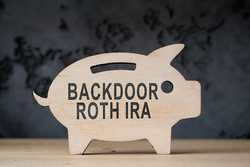Can You (and Should You) Use an IRA to Buy a Home?

Our evaluations and opinions are not influenced by our advertising relationships, but we may earn a commission from our partners’ links. This content is created by TIME Stamped, under TIME’s direction and produced in accordance with TIME’s editorial guidelines and overseen by TIME’s editorial staff. Learn more about it.
Can you use an IRA to buy a home? The short answer is yes. Should you use an IRA to purchase a home? The answer is that it depends. Let’s take a closer look at these questions and the answers to them.
Find the right financial advisor with WiserAdvisor
Find the right financial advisor with WiserAdvisor
You can withdraw funds from your IRA for any purpose that you desire at any time. It is your money. However, it’s important to understand the potential ramifications.
Tapping into an IRA account early can result in taxes and possible penalties. Withdrawals from a traditional IRA will result in taxes unless some of the money withdrawn relates to after-tax contributions.
Withdrawals from a Roth IRA can be tax and penalty free if they consist only of your own contributions to the plan. Withdrawals of earnings inside the account prior to age 59½ can be subject to a penalty and perhaps taxes unless certain exceptions apply.
There is a first-time homebuyer exception for traditional IRAs. Under this exception there are no penalties for a withdrawal connected to the purchase of a home for a first-time buyer. The exception does not exempt you from paying any income taxes due for the withdrawal.
The exception is limited to $10,000, if you are married you and your spouse can each withdraw $10,000 from your own IRAs. The exception is once per lifetime, so you can’t use it to buy your house and use it again to buy a house for your grandkids, for example.
To qualify as a first-time homebuyer you cannot have owned a home as a principal residence within two years of the date that you acquire your new home. This restriction would not apply, for example if you owned a vacation home that was not your principal residence. If you are married, your spouse must also meet this criteria. The money from the withdrawal must be used to acquire a home and not for another purpose.
The first time homebuyer exemption can also apply to:
This means that a first-time homebuyer exception can be made to assist these first time homebuyers as well.
Roth IRA accounts also have first-time homebuyer exceptions. The definition of first-time homebuyer is the same as outlined above for a traditional IRA.
The $10,000 first time homebuyer exemption says that for someone who meets the definition—both of you, if a married couple—then the withdrawal will be both penalty- and tax-free as long as the five-year rule on the Roth account has been satisfied. The five-year rule says you must wait five years from the first tax year you made a contribution to your Roth IRA to take a tax- and penalty-free distribution.
Note that with a Roth IRA, you can always withdraw the amount you have contributed to the Roth IRA penalty- and tax-free. You can do this first, then use the exemption to eliminate penalties and taxes on additional withdrawals that might include account earnings.
For many prospective homebuyers, their IRA might represent a significant pool of money, perhaps their largest single source of funds. Their inclination might be to tap into their IRA as a source of funds for a down payment. This may not be a good idea in many cases as we will discuss below.
An individual retirement account (IRA) is a retirement savings vehicle, as the name indicates. Taking money from an IRA can diminish the chances of achieving a comfortable retirement or of being able to retire at all.
The impact of taking money from an IRA to buy a house will potentially have a bigger impact on somebody age 50 or over than a younger IRA account holder. Someone age 50 or over has less time until they retire and therefore less time to replenish the money taken from their IRA. Younger account holders have more time if they are able to contribute money back into their IRA and keep the money invested until retirement.
If the withdrawal is subject to both income taxes and a penalty, this can get very expensive. For example if you were to withdraw $50,000 from a traditional IRA and your tax rate is 25% plus a 10% penalty, the withdrawal would look like this:
| IRA withdrawal amount | $50,000 |
|---|---|
Taxes | $12,500 |
Penalty | $5,000 |
Total cost | $67,500 |
This can become a very expensive source of funds if you need to pay taxes and a penalty on the withdrawal.
Withdrawing money from an IRA to purchase a home or any other purpose can trigger taxes and/or penalties. This will vary based on the type of IRA account, your age, and other factors.
Here are some of the basics about taxes and penalties for both Roth and traditional IRAs.
Money withdrawn from a traditional IRA is always subject to income taxes with the exception of any amount that is connected to contributions that were made on an after-tax basis, if any.
In addition, for those who are under the age of 59½ there will be a 10% penalty in addition to the taxes due. There are a number of exceptions to the 10% penalty, including one for first time home buyers.
Money withdrawn from a Roth IRA is tax- and penalty-free if you are at least age 59½ and the account has met the five-year rule. If the five-year rule has not been met but you are at least 59½, then the withdrawal may be taxed, but no penalties will apply. If you are under 59½ and have not met the five-year rule then withdrawals may be subject to both taxes and a penalty.
You can always withdraw the contributions that you have made to the Roth IRA tax- and penalty-free.
There are some additional exceptions to both the penalty and the taxes, including an exemption for first-time homebuyers discussed below.
Again, just because you can tap your IRA to put towards a home purchase doesn’t mean that you should. There are a number of alternatives for the down payment or other funds to use towards a home purchase.
If you have money in a savings, money market, or other type of non-retirement account this can be a good source of funds. Unless you sell investments and realize a gain, money from taxable accounts generally will not have any tax consequences if used for a home purchase.
Investments such as stocks, bonds, mutual funds, and ETFs can be used to raise the funds needed for a down payment or to cover other costs related to the purchase of a home. Be sure to understand the tax impact of any gains or losses from selling these holdings.
Many 401(k) plans allow participants to take a loan against their balance. The regulations require that a 401(k) loan be repaid via regular amortization over a period of not more than five years. A longer repayment period is allowed if the loan is used to purchase your primary residence. The repayment period can be decided by the employer plan sponsor. The interest paid on the loan is essentially paid to yourself.
This can be a good source of funds for expenditures like a down payment or closing costs on the purchase of a house.
If you leave the company before the 401(k) loan is repaid, you will need to repay the outstanding balance. If you don't, the outstanding amount could become a distribution from your 401(k) and subject to taxes and any penalties. Repayment options can vary among companies in this situation.
If you aren’t buying a principal property to live in, and you want to use retirement funds to buy investment property, a self-directed IRA might be a realistic option. You generally will not be able to purchase investment real estate inside of an IRA at most conventional custodians. Self-directed IRAs are different, however: These IRAs are geared to hold non-traditional assets such as precious metals, hedge funds and real estate.
You can use the money in the IRA to purchase real estate. This can include a home, an apartment building, or commercial real estate. You can also make a loan to a borrower backed by real estate. The one key is that the real estate inside of the self-directed IRA cannot be for personal use. This kind of investment is not for beginners, so you may want to find a knowledgeable financial advisor through WiserAdvisor to guide you.
Find the right financial advisor with WiserAdvisor
Find the right financial advisor with WiserAdvisor
You can but only if you withdraw some or all of the money from the IRA. Funds held inside of an IRA will generally not be considered as part of your assets in qualifying for a mortgage.
In order to be considered a first-time homebuyer you cannot have owned a home as your primary residence for at least two years prior to trying to purchase a new home. This applies to your spouse if you are married.
Children, grandchildren as well as parents can be considered first-time homebuyers if they qualify for the purpose of taking the first-time homebuyer exception for withdrawing funds from an IRA.
The information presented here is created by TIME Stamped and overseen by TIME editorial staff. To learn more, see our About Us page.




